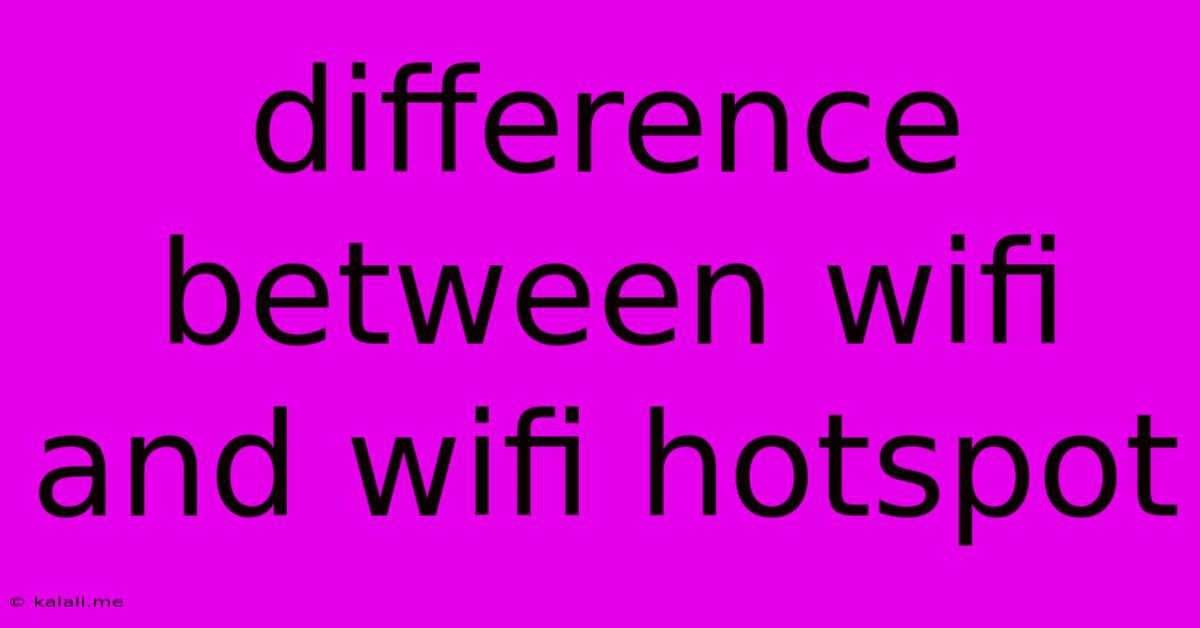Difference Between Wifi And Wifi Hotspot
Kalali
Jun 14, 2025 · 3 min read

Table of Contents
WiFi vs. WiFi Hotspot: What's the Difference?
Many people use the terms "WiFi" and "WiFi hotspot" interchangeably, but there's a key distinction. Understanding this difference is crucial for effectively using your internet connection and sharing it with others. This article will break down the core differences between WiFi and a WiFi hotspot, clarifying the functionalities and applications of each.
While both relate to wireless internet access, they represent different aspects of the technology. WiFi refers to the standard itself, while a WiFi hotspot is a specific implementation of that standard.
What is WiFi?
WiFi, short for Wireless Fidelity, is a wireless networking technology that uses radio waves to connect devices to the internet or a local network. Think of it as the underlying language or protocol. It defines how devices communicate wirelessly, establishing a connection between a router and your laptop, smartphone, or smart TV. Your home internet likely uses WiFi to transmit data from your router to your devices. Key characteristics of WiFi include:
- Network standard: Operates on specific frequency bands (2.4 GHz and 5 GHz) and protocols (like 802.11a, b, g, n, ac, and ax).
- Infrastructure: Requires a router or access point connected to a broadband internet source (like a cable modem or DSL).
- Range: Covers a specific area determined by the router's power and environmental factors.
- Security: Employs various security protocols (like WPA2 and WPA3) to protect the network from unauthorized access.
What is a WiFi Hotspot?
A WiFi hotspot is a physical location that provides WiFi internet access. It's a specific instance of using WiFi technology. A hotspot can be created in numerous ways:
- Public Hotspots: These are commonly found in cafes, libraries, airports, and hotels. They're usually provided by the establishment and often require authentication (sometimes paid).
- Mobile Hotspots: Your smartphone or other mobile device can act as a hotspot, sharing its cellular data connection through WiFi with other devices. This is incredibly useful when you're traveling and need internet access where WiFi isn't available.
- Router-based Hotspots: Your home router itself creates a WiFi hotspot. Your devices connect to this hotspot to access the internet via your broadband connection.
Essentially, a WiFi hotspot is using the WiFi standard to create a localized area of wireless internet access.
Key Differences Summarized:
| Feature | WiFi | WiFi Hotspot |
|---|---|---|
| Definition | Wireless networking technology | Area providing WiFi internet access |
| Functionality | Enables wireless communication | Provides access to a network connection |
| Implementation | Underlying standard | Specific application of the WiFi standard |
| Source | Router or access point | Router, mobile device, or public network |
Understanding the Relationship:
Think of WiFi as the language, and a WiFi hotspot as a conversation using that language. You need the language (WiFi) to have the conversation (access the internet via a hotspot). A hotspot utilizes WiFi technology to share internet access.
By understanding the difference between WiFi and a WiFi hotspot, you can better manage your internet connections and take advantage of various wireless networking options available to you. Whether you are setting up a home network or using a public hotspot, knowing these basics will improve your online experience.
Latest Posts
Latest Posts
-
Si Unit For Density Of Water
Jun 14, 2025
-
Which Of These Volcanic Eruption Types Is The Most Violent
Jun 14, 2025
-
Which Bone Is Not In The Middle Ear
Jun 14, 2025
-
What Is The Largest Cell In The Body
Jun 14, 2025
-
How Many Kg Is 350 Lbs
Jun 14, 2025
Related Post
Thank you for visiting our website which covers about Difference Between Wifi And Wifi Hotspot . We hope the information provided has been useful to you. Feel free to contact us if you have any questions or need further assistance. See you next time and don't miss to bookmark.